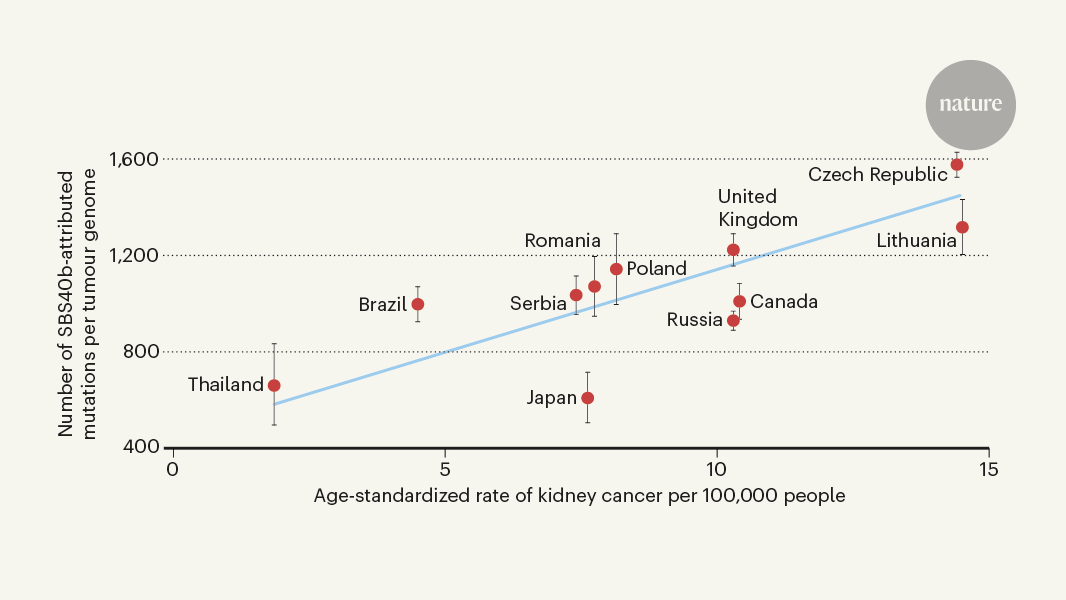insight - Computational Biology - # Genomic Analysis of Somatic Mutations in Clear Cell Renal Cell Carcinoma
Global Prevalence of Unknown Mutation-Inducing Agents Revealed Through Genomic Analysis of Kidney Tumors
Core Concepts
Widespread exposure to unidentified chemical agents can lead to the accumulation of somatic mutations in cells, some of which may contribute to the development of cancer.
Abstract
The article discusses a study conducted by Senkin et al. that analyzed over 900 samples of clear cell renal cell carcinoma (a type of kidney tumor) from different parts of the world. The researchers found that daily exposure to unknown chemical agents can cause cells in the body to accumulate genetic changes called somatic mutations. While most of these mutations do not significantly affect cellular function, a small fraction can corrupt genetic instructions and transform a normal cell into a cancer cell. The study highlights the global prevalence of these mutation-promoting agents and the need for further investigation to identify and mitigate their impact on human health.
Genomics reveal unknown mutation-promoting agents at global sites
Stats
The study analyzed more than 900 samples of clear cell renal cell carcinoma from different parts of the world.
Quotes
None
Key Insights Distilled From
by Irene Franco at www.nature.com 05-01-2024
https://www.nature.com/articles/d41586-024-01190-6
Deeper Inquiries
What specific chemical agents or environmental factors are responsible for the high prevalence of somatic mutations observed in the study?
The study by Senkin et al. focused on clear cell renal cell carcinoma and identified various chemical agents and environmental factors that contribute to the accumulation of somatic mutations. These factors include daily exposure to carcinogens such as tobacco smoke, ultraviolet radiation, industrial chemicals, and pollutants in the air and water. These agents can induce DNA damage and mutations in cells, leading to the development of cancerous tumors. By analyzing over 900 samples of kidney tumors from different regions, the study highlighted the global impact of these mutation-promoting agents on somatic mutations in clear cell renal cell carcinoma.
How can the findings of this study be used to develop strategies for early detection and prevention of cancer caused by exposure to these unknown mutation-inducing agents?
The findings of this study provide valuable insights into the genetic changes associated with clear cell renal cell carcinoma and shed light on the role of environmental factors in cancer development. By understanding the specific mutation-promoting agents identified in the study, researchers and healthcare professionals can develop targeted screening programs for individuals at high risk of exposure to these agents. Early detection strategies, such as genetic testing and biomarker analysis, can help identify individuals with a higher likelihood of developing cancer due to exposure to these mutation-inducing agents. Additionally, public health initiatives aimed at reducing exposure to known carcinogens can help prevent the onset of cancer and improve overall population health.
What implications do the study's findings have for our understanding of the role of environmental factors in the development of other types of cancer beyond clear cell renal cell carcinoma?
The study's findings have broader implications for understanding the role of environmental factors in the development of various types of cancer beyond clear cell renal cell carcinoma. By demonstrating the impact of chemical agents and pollutants on somatic mutations, the study highlights the importance of environmental risk factors in cancer etiology. These findings underscore the need for comprehensive cancer prevention strategies that address exposure to carcinogens in the environment. Furthermore, the study emphasizes the significance of genomics in elucidating the molecular mechanisms underlying cancer development and progression, paving the way for personalized medicine approaches in cancer treatment and prevention.
0
